【弯道超车】Unit 1 Wise men in history 核心语法之过去完成时-2025年沪教牛津版九年级英语上册精讲精练 (含答案解析)
文档属性
| 名称 | 【弯道超车】Unit 1 Wise men in history 核心语法之过去完成时-2025年沪教牛津版九年级英语上册精讲精练 (含答案解析) |
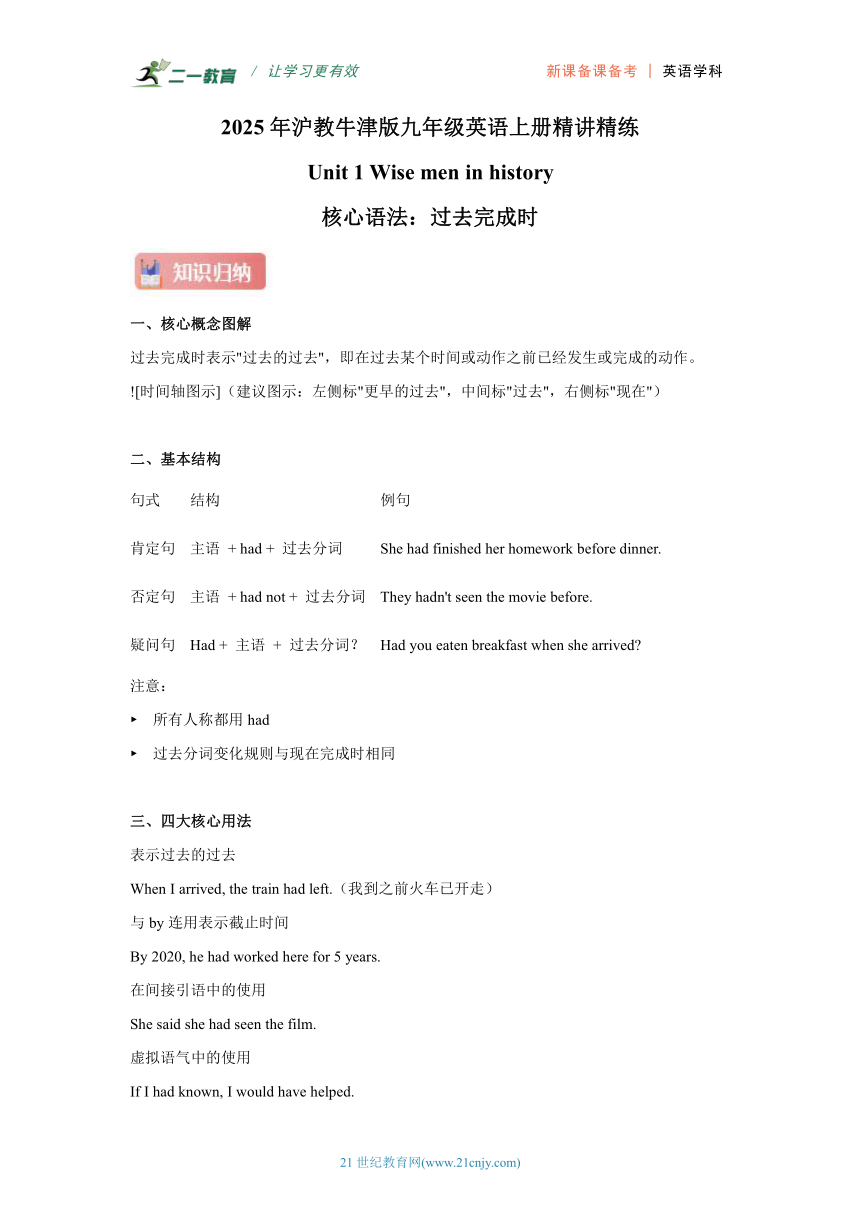
|
|
| 格式 | docx | ||
| 文件大小 | 64.4KB | ||
| 资源类型 | 试卷 | ||
| 版本资源 | 牛津深圳版 | ||
| 科目 | 英语 | ||
| 更新时间 | 2025-07-16 17:59:37 | ||
图片预览

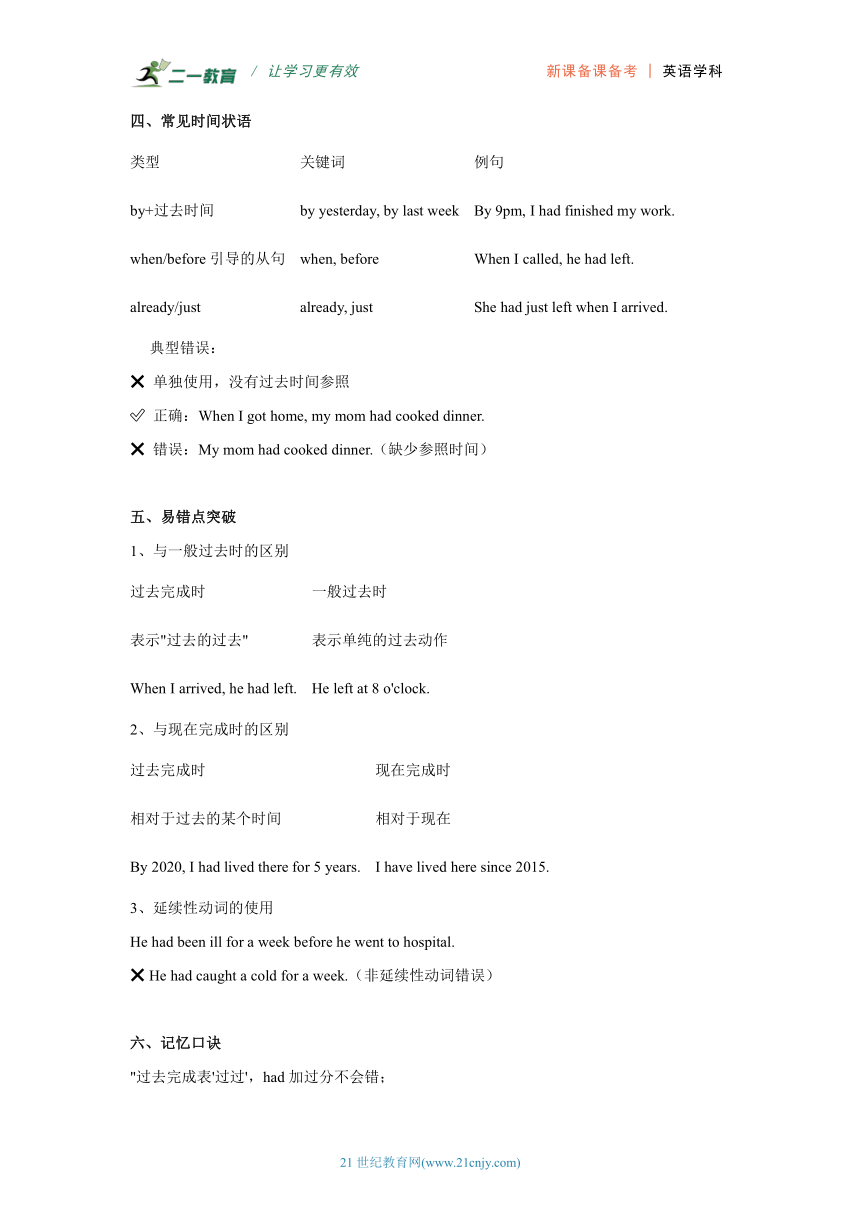
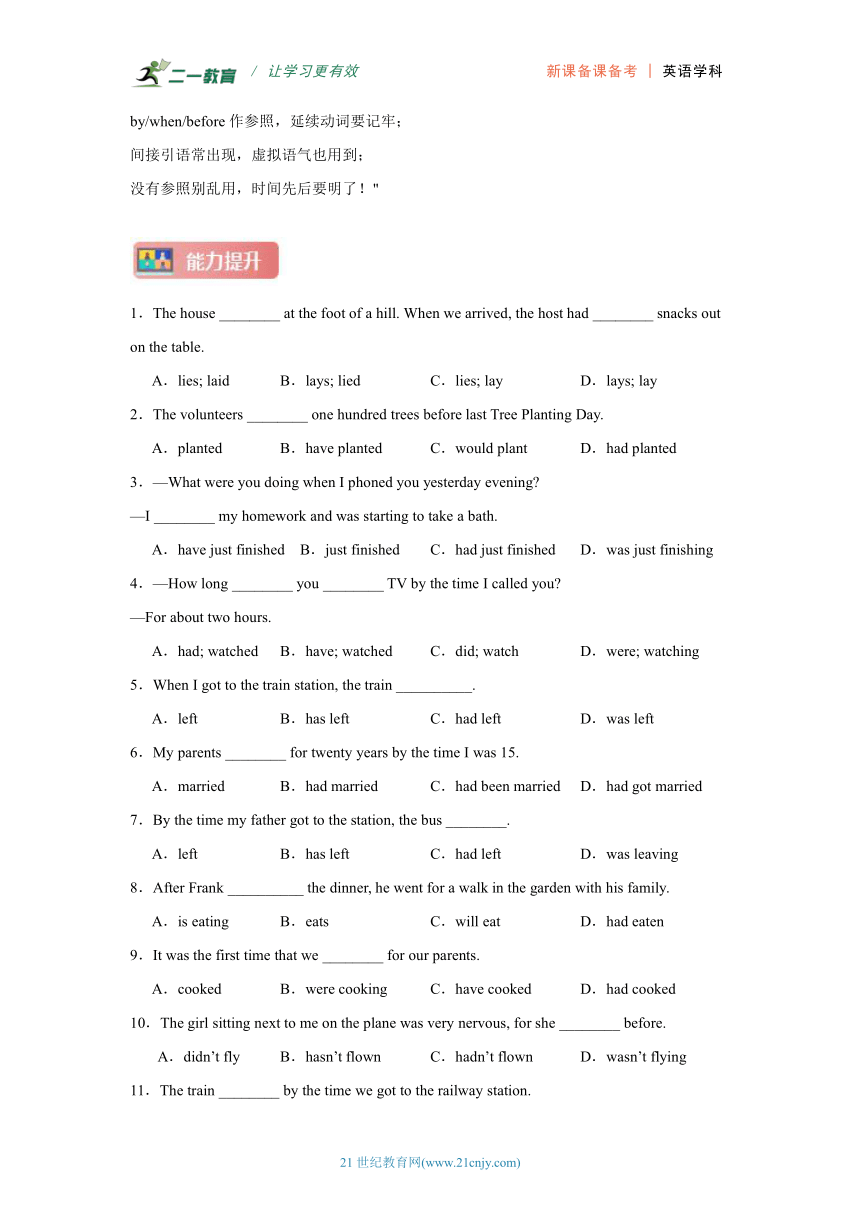
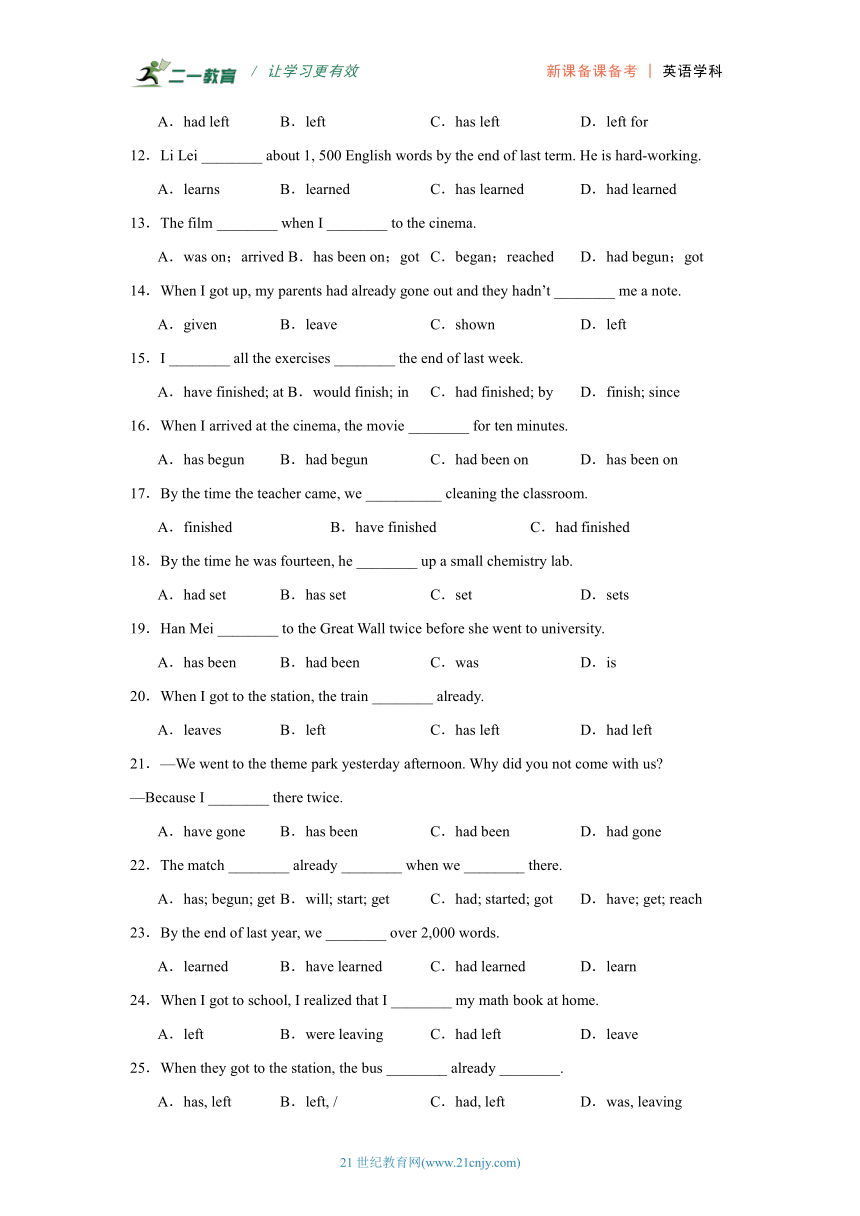
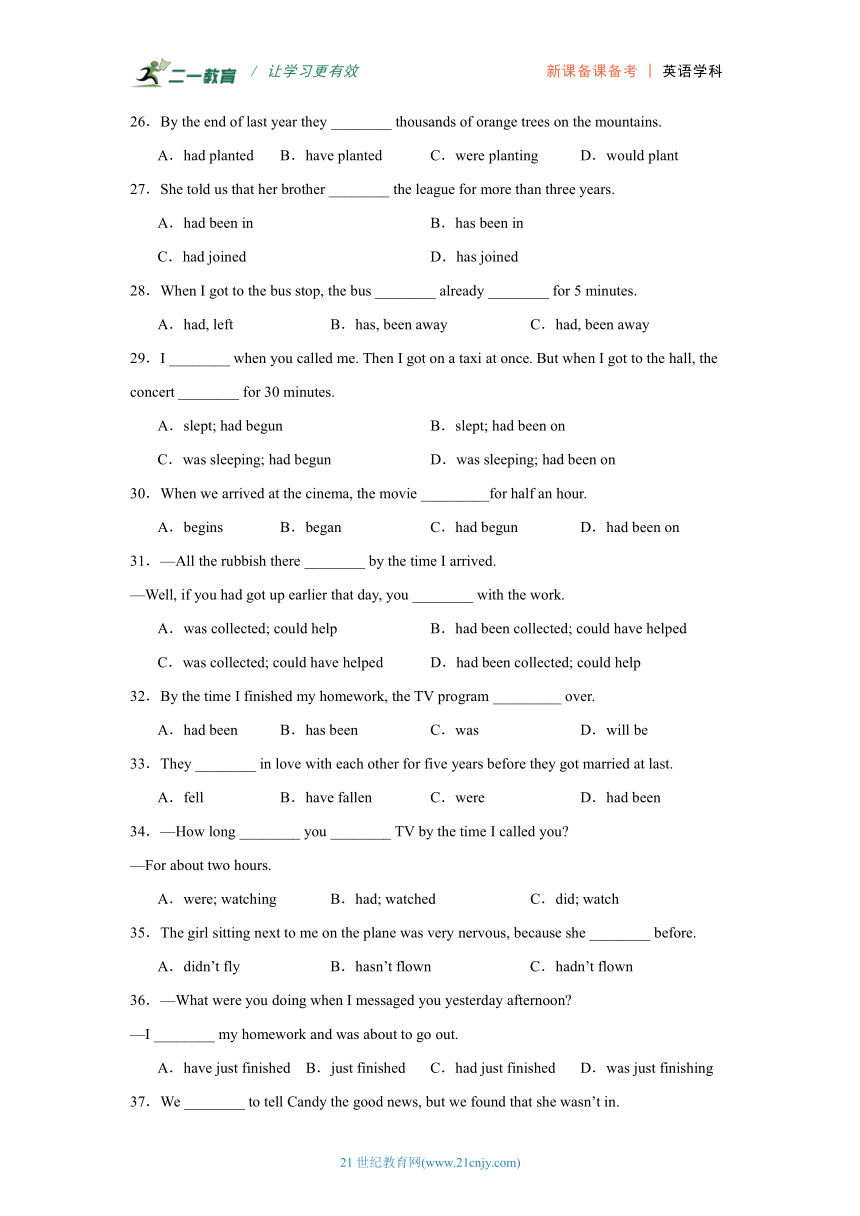
文档简介
/ 让学习更有效 新课备课备考 | 英语学科
/ 让学习更有效 新课备课备考 | 英语学科
2025年沪教牛津版九年级英语上册精讲精练
Unit 1 Wise men in history
核心语法:过去完成时
一、核心概念图解
过去完成时表示"过去的过去",即在过去某个时间或动作之前已经发生或完成的动作。

二、基本结构
句式 结构 例句
肯定句 主语 + had + 过去分词 She had finished her homework before dinner.
否定句 主语 + had not + 过去分词 They hadn't seen the movie before.
疑问句 Had + 主语 + 过去分词? Had you eaten breakfast when she arrived
注意:
所有人称都用 had
过去分词变化规则与现在完成时相同
三、四大核心用法
表示过去的过去
When I arrived, the train had left.(我到之前火车已开走)
与by连用表示截止时间
By 2020, he had worked here for 5 years.
在间接引语中的使用
She said she had seen the film.
虚拟语气中的使用
If I had known, I would have helped.
四、常见时间状语
类型 关键词 例句
by+过去时间 by yesterday, by last week By 9pm, I had finished my work.
when/before引导的从句 when, before When I called, he had left.
already/just already, just She had just left when I arrived.
典型错误:
单独使用,没有过去时间参照
正确:When I got home, my mom had cooked dinner.
错误:My mom had cooked dinner.(缺少参照时间)
五、易错点突破
1、与一般过去时的区别
过去完成时 一般过去时
表示"过去的过去" 表示单纯的过去动作
When I arrived, he had left. He left at 8 o'clock.
2、与现在完成时的区别
过去完成时 现在完成时
相对于过去的某个时间 相对于现在
By 2020, I had lived there for 5 years. I have lived here since 2015.
3、延续性动词的使用
He had been ill for a week before he went to hospital.
He had caught a cold for a week.(非延续性动词错误)
六、记忆口诀
"过去完成表'过过',had加过分不会错;
by/when/before作参照,延续动词要记牢;
间接引语常出现,虚拟语气也用到;
没有参照别乱用,时间先后要明了!"
1.The house ________ at the foot of a hill. When we arrived, the host had ________ snacks out on the table.
A.lies; laid B.lays; lied C.lies; lay D.lays; lay
2.The volunteers ________ one hundred trees before last Tree Planting Day.
A.planted B.have planted C.would plant D.had planted
3.—What were you doing when I phoned you yesterday evening
—I ________ my homework and was starting to take a bath.
A.have just finished B.just finished C.had just finished D.was just finishing
4.—How long ________ you ________ TV by the time I called you
—For about two hours.
A.had; watched B.have; watched C.did; watch D.were; watching
5.When I got to the train station, the train __________.
A.left B.has left C.had left D.was left
6.My parents ________ for twenty years by the time I was 15.
A.married B.had married C.had been married D.had got married
7.By the time my father got to the station, the bus ________.
A.left B.has left C.had left D.was leaving
8.After Frank __________ the dinner, he went for a walk in the garden with his family.
A.is eating B.eats C.will eat D.had eaten
9.It was the first time that we ________ for our parents.
A.cooked B.were cooking C.have cooked D.had cooked
10.The girl sitting next to me on the plane was very nervous, for she ________ before.
A.didn’t fly B.hasn’t flown C.hadn’t flown D.wasn’t flying
11.The train ________ by the time we got to the railway station.
A.had left B.left C.has left D.left for
12.Li Lei ________ about 1, 500 English words by the end of last term. He is hard working.
A.learns B.learned C.has learned D.had learned
13.The film ________ when I ________ to the cinema.
A.was on;arrived B.has been on;got C.began;reached D.had begun;got
14.When I got up, my parents had already gone out and they hadn’t ________ me a note.
A.given B.leave C.shown D.left
15.I ________ all the exercises ________ the end of last week.
A.have finished; at B.would finish; in C.had finished; by D.finish; since
16.When I arrived at the cinema, the movie ________ for ten minutes.
A.has begun B.had begun C.had been on D.has been on
17.By the time the teacher came, we __________ cleaning the classroom.
A.finished B.have finished C.had finished
18.By the time he was fourteen, he ________ up a small chemistry lab.
A.had set B.has set C.set D.sets
19.Han Mei ________ to the Great Wall twice before she went to university.
A.has been B.had been C.was D.is
20.When I got to the station, the train ________ already.
A.leaves B.left C.has left D.had left
21.—We went to the theme park yesterday afternoon. Why did you not come with us
—Because I ________ there twice.
A.have gone B.has been C.had been D.had gone
22.The match ________ already ________ when we ________ there.
A.has; begun; get B.will; start; get C.had; started; got D.have; get; reach
23.By the end of last year, we ________ over 2,000 words.
A.learned B.have learned C.had learned D.learn
24.When I got to school, I realized that I ________ my math book at home.
A.left B.were leaving C.had left D.leave
25.When they got to the station, the bus ________ already ________.
A.has, left B.left, / C.had, left D.was, leaving
26.By the end of last year they ________ thousands of orange trees on the mountains.
A.had planted B.have planted C.were planting D.would plant
27.She told us that her brother ________ the league for more than three years.
A.had been in B.has been in
C.had joined D.has joined
28.When I got to the bus stop, the bus ________ already ________ for 5 minutes.
A.had, left B.has, been away C.had, been away
29.I ________ when you called me. Then I got on a taxi at once. But when I got to the hall, the concert ________ for 30 minutes.
A.slept; had begun B.slept; had been on
C.was sleeping; had begun D.was sleeping; had been on
30.When we arrived at the cinema, the movie _________for half an hour.
A.begins B.began C.had begun D.had been on
31.—All the rubbish there ________ by the time I arrived.
—Well, if you had got up earlier that day, you ________ with the work.
A.was collected; could help B.had been collected; could have helped
C.was collected; could have helped D.had been collected; could help
32.By the time I finished my homework, the TV program _________ over.
A.had been B.has been C.was D.will be
33.They ________ in love with each other for five years before they got married at last.
A.fell B.have fallen C.were D.had been
34.—How long ________ you ________ TV by the time I called you
—For about two hours.
A.were; watching B.had; watched C.did; watch
35.The girl sitting next to me on the plane was very nervous, because she ________ before.
A.didn’t fly B.hasn’t flown C.hadn’t flown
36.—What were you doing when I messaged you yesterday afternoon
—I ________ my homework and was about to go out.
A.have just finished B.just finished C.had just finished D.was just finishing
37.We ________ to tell Candy the good news, but we found that she wasn’t in.
A.mean B.have meant C.had meant D.meant
38.By the time I rushed into the cinema, the movie ________ for half an hour.
A.had begun B.began C.was on D.had been on
39.Seeing John rush into the room with tears in his eyes, I asked him what ________.
A.would happen B.had happened C.happened D.was happened
40.By the time Roy walked into the classroom, the teacher ________ teaching already.
A.started B.would start C.starts D.had started
41.When he got to the airport, he found he__________ their passport at home.
A.left B.has left C.had left D.was left
42.When I arrived at the cinema, the movie ________ already.
A.starts B.started C.has started D.had started
43.When I got to the cinema, the film ________ for ten minutes.
A.has begun B.had begun C.had been on D.was on
44.Most of the work ________ by the time we arrived.
A.was done B.were done C.had been done D.have been done
45.By the time I got to the bus stop, I realized I ________ my school ID card at school.
A.left B.have left C.had left
46.By the time I called, they ________ their decision about the project.
A.have made B.had made C.made D.were making
47.By the end of last Sunday, AI ______ all the tasks on time.
A.finished B.has finished C.had finished D.finishes
48.By the time I got to school, I realized that I ________ my dictionary at home.
A.has left B.had forgotten C.had left
49.There was a traffic jam this morning, so when Tina ________ to the airport, the plane ________ for ten minutes.
A.got; had been away B.got; had left C.gets; has been away D.gets; has left
50.By the time I got to school, Tom ________ up in the classroom.
A.has shown B.had shown C.showed
51.By the end of last year, they ________ (learn) English for five years.
A.learned B.have learned C.had learned D.will learn
52.By the time I got to the bus stop, the bus ________ (already leave).
A.has already left B.had already left C.already left D.will already leave
53.How long ________ the film ________ when you got to the cinema
A.has; been on B.has; begun C.had; begun D.had; been on
54.When we got to the cinema, the film ________ for 20 minutes.
A.had begun B.has been on C.had been on D.has begun
55.Last Thursday my brother told me he ________ an interesting book about the WTO two days before and that China ________ the WTO in 2001.
A.read; joined B.read; had joined C.had read; joined D.had read; had joined
56.By the time I arrived at the cinema, the film ________.
A.is starting B.started C.has started D.had started
57.By nine o’clock yesterday evening, we ________ our work.
A.have finished B.finished C.had finished
58.By the end of last month, I________ more than two hundred different fans.
A.collected B.have collected C.had collected
59.By the end of last year, they ________ over ten thousand homeless people.
A.helps B.has helped C.will help D.had helped
60.When I arrived at the cinema, the movie ________ for thirty minutes.
A.had begun B.had been on C.has begun D.has been on
/ 让学习更有效 新课备课备考 | 英语学科
/ 让学习更有效 新课备课备考 | 英语学科
21世纪教育网(www.21cnjy.com)
21世纪教育网(www.21cnjy.com)
参考答案及试题解析
1.A
【解析】句意:这所房子坐落在山脚下。当我们到达时,主人已经在桌子上放好了零食。
考查时态和动词辨析。lies位于,坐落在;laid放(过去式);lay放。根据“The house…at the foot of a hill.”可知,房子坐落在山脚下,应该用lie,且陈述客观事实,应该用一般现在时,主语The house是第三人称单数,故第一空填lies。根据“the host had…snacks out on the table.”可知,主人放好了零食,应该用lay,根据“had”可知,此处句子时态为过去完成时,lay的过去分词是laid。故选A。
2.D
【解析】句意:在去年植树节之前,志愿者们已经种了一百棵树。
考查动词时态。根据“before last Tree Planting Day”可知,表示过去的过去发生的动作,用过去完成时态“had done”,故选D。
3.C
【解析】句意:——昨晚我给你打电话时你在做什么?——我刚做完作业,正准备洗澡。
考查过去完成时的用法。根据“when I phoned you yesterday evening”和“and was starting to take a bath”可知,做完作业发生在打电话这一过去动作之前,过去的过去,需用过去完成时,结构为had done。故选C。
4.A
【解析】句意:——我给你打电话时你看了多长时间电视?——大约两个小时。
考查动词时态。had…watched过去完成时;have…watched现在完成时;did…watch一般过去时;were…watching过去进行时。根据by the time“到……时候为止”,可知表示事情发生在过去的过去,用过去完成时,结构是“had+动词的过去分词”,故选A。
5.C
【解析】句意:当我到火车站的时候,火车已经开了。
考查过去完成时。根据句意可知,火车在我到达火车站之前就开了, 而got to是过去时, leave“离开”这一动作在got to之前已经发生, 所以要用过去完成时,过去完成时的结构是had+过去分词,leave的过去分词是left。故选C。
6.C
【解析】句意:到我15岁时,我父母已经结婚20年了。
考查时态。根据“for twenty years by the time I was 15.”可知,此处表示在某个过去的时间之前已经发生的动作,应用过去完成时,排除A选项,且句中动词要用延续性动词,B/C/D三个选项中C选项是延续性动词,故选C。
7.C
【解析】句意:在我父亲到车站的时候,公交车已经离开了。
考查时态。根据“By the time my father got to the station”可知公交车离开的动作发生在到达之前,用过去完成时had done。故选C。
8.D
【解析】句意:弗兰克吃完晚饭后,和家人一起去花园里散步。
考查动词时态。is eating现在进行时;eats吃,一般现在时;will eat一般将来时;had eaten过去完成时。此处是after引导的时间状语从句,根据“he went for a walk in the garden with his family”可知主句用的一般过去时,结合选项,从句用过去完成时符合,故选D。
9.D
【解析】句意:这是我们第一次为父母做饭。
考查动词时态。“It is the first time +从句”的结构中,从句用现在完成时,此处为“It was the first time that+从句”结构,从句应用过去完成时“had+动词过去分词”,故选D。
10.C
【解析】句意:飞机上坐在我旁边的那个女孩非常紧张,因为她以前没有坐过飞机。
考查动词时态。主句用了一般过去时,原因状语从句表示“她以前从未坐过飞机”是比主句动作更早的事情,指过去的过去,故用过去完成时。故选C。
11.A
【解析】句意:当我们到达火车站时,火车已经开走了。
考查时态。根据“we got to”,可知“我们到达”为过去时,而“火车离开”这个动作是发生在“我们到达车站”前,表示过去的过去,所以用过去完成时,过去完成时的构成“主语+had +动词的过去分词”。故选A。
12.D
【解析】句意:到上学期末,李磊已经学会了大约1500个英语单词。他学习很努力。
考查动词时态。“by+过去的时间段”意为“到……为止”,表示句中的动作发生在过去的过去,应用过去完成时的“had+动词过去分词”,故选D。
13.D
【解析】句意:当我到电影院的时候,电影已经开始了。
考查一般过去时和过去完成时。begin开始,延续性动词是be on;arrive到达,后面接介词in/at;get to到达;reach到达,后面直接接宾语,根据第二个空后的“to the cinema”可知,应该是到电影院,用got,排除A和C,“电影开始”发生在“到电影院”之前且“到电影院”是一般过去时,所以第一个空用过去完成时,指“发生在过去的过去”,排除B,故选D。
14.D
【解析】句意:当我起床时,我的父母已经出去了,他们没有给我留下一张纸条。
考查动词辨析。given给;leave离开/留下,原形;shown展示;left离开/留下,过去分词。此空前用的hadn’t,可知时态为过去完成时,结构had+动词过去分词,leave“离开,留下”的过去分词为left。故选D。
15.C
【解析】句意:到上周末为止,我已经完成了所有的练习。
考查动词时态和介词辨析。at后加具体的时刻;in后加某年某月某季节;by加时间表示“截止在这个时间点以前”,这个时间点是过去的,那就常用于过去完成时;since自从。固定短语by the end of+过去的时间点“到……为止”,句子需用过去完成时,其结构为:had done。故选C。
16.C
【解析】句意:当我到达电影院时,电影已经开始了10分钟。
考查过去完成时。根据“When I arrived at the cinema”可知,时态为一般过去时。而“电影开始”发生在“到达”之前,要用过去完成时,结构为had+过去分词;begin为非延续性动词,不能与一段时间连用,要转化为表示状态的be on。故选C。
17.C
【解析】句意:老师来的时候,我们已经打扫完了教室。
考查过去完成时。A. finished表一般过去时;B. have finished表现在完成时;C. had finished表过去完成时。根据英语语法,by the time引导时间状语从句,从句为一般过去时,主句应用过去完成时,表示截止到从句动作发生时,主句动作已经完成,即过去的过去。故选C。
18.A
【解析】句意:到他十四岁的时候,他已经建立了一个小型化学实验室。
考查过去完成时。根据“By the time he was fourteen”可知,到14岁时,他已经建立了一个小型化学实验室,此处应用过去完成时“had+动词过去分词”,表示过去的过去,set的过去分词为set。故选A。
19.B
【解析】句意:韩梅在上大学之前去过两次长城。
考查动词时态。根据“before she went to university”可知,上大学发生在过去,去长城是发生在上大学前,所以主句动作是发生在“过去的过去”,应用过去完成时“had+动词过去分词”,故选B。
20.D
【解析】句意:当我到达车站时,火车已经开走了。
考查动词时态。leaves离开,一般现在时;left是一般过去时;has left是现在完成时;had left是过去完成时。根据“When I got to the station”可知,“到达车站”是过去的动作,而“火车开走”发生在“到达”之前,即过去的过去,应用过去完成时,故选D。
21.C
【解析】句意:——我们昨天下午去了主题公园。你为什么不和我们一起去?——因为我去过那里两次了。
考查现在完成时。根据“Because I…there twice.”可知,本句表达的是已经去过主题公园两次了,表示动作发生在过去的过去,需用过去完成时,主语是“I”,其谓语结构是had+done,结合选项可知,排除AB。根据“twice”可知已经回来,需用had been。故选C。
22.C
【解析】句意:当我们到达那儿,比赛已经开始了。
考查动词时态。has/have+动词过去分词,现在完成时;had+动词过去分词,过去完成时;will+动词原形,将来时;begun开始,过去分词;start开始,原形;started开始,过去分词;get得到,原形;got得到,过去式;reach到达,原形。从句应用一般过去时,而主句表示在过去的动作之前已经发生了的动作,应用过去完成时。故选C。
23.C
【解析】句意:到去年年底,我们已经学习了超过2000个单词。
考查过去完成时。结合时间状语“By the end of last year”及语境可知,此处应在讲述到去年年底说话者的学习情况,表示一个动作或状态在过去某一时间或动作之前已经完成或结束,或对“过去的过去”造成的影响或结果,时态应用过去完成时,其结构为“had done sth.”。故选C。
24.C
【解析】句意:当我到达学校时,我意识到我把数学书忘在家里了。
考查时态。根据“When I got to school, I realized...”可知,包忘在家里的时间发生在“过去的过去”,即到达学校之前,所以应用过去完成时“had+动词过去分词”,故选C。
25.C
【解析】句意:当他们到达车站时,公共汽车已经开走了。
考查动词时态。has left离开,现在完成时;left过去式;had left过去完成时;was leaving过去进行时。根据“already”可知是完成时,表示“已经开走了”;且从句“When they got to the station”使用的是过去时,而主句的动作“离开”发生在他们“到达”之前,应是“过去的过去”,即使用过去完成时,故选C。
26.A
【解析】句意:到去年年底为止,他们已经在山上种了成千上万棵橘子树。
考查过去完成时。根据时间状语“By the end of last year (到去年年底为止)”可知,句子的时态是过去完成时,其谓语动词构成是had done,所以空处应是had planted。故选A。
27.A
【解析】句意:她告诉我们她哥哥已经加入联盟三年多了。
考查过去完成时态。本句是that引导的宾语从句,时态上遵循“主现从不限,主过从必过”原则;主句是一般过去时态,从句也应该用相应的过去某个时态;根据“for more than three years”可知,表示过去某一时刻或某一动作之前已完成的动作或状态,用过去完成时,结构是:had+动词的过去分词。join是非延续性动词,不能与时间段连用,要变为延续性动作be in。be的过去分词是been。故选A。
28.C
【解析】句意:当我到达公共汽车站时,公共汽车已经开走了5分钟。
考查动词时态和延续性动词。leave离开,过去分词是left,短暂性动词;be away离开,延续性动词。根据“already”和“When I got to the bus stop”可知,应是在到车站前车就离开了,所以是强调过去的过去,所以用过去完成时,结合“for 5 minutes”是时间段可知,空处需用延续性动词。故选C。
29.D
【解析】句意:当你给我打电话时我正在睡觉。然后我立刻打了辆出租车。但当我到达大厅时,音乐会已经开始了30分钟。
考查过去进行时和过去完成时的用法。根据“when you called me”可知,此处表示“你打电话时我正在睡觉”,第一空要用过去进行时表示当时正在进行的动作,可排除AB选项。根据“for 30 minutes”可知,第二空要用过去完成时表示持续状态,begin是瞬间动词不能接时间段,be on可以表示持续状态。故选D。
30.D
【解析】句意:当我们到达电影院时,电影已经放映了半个小时了。
考查动词时态。根据“When we arrived at the cinema, the movie ... for half an hour.”并结合选项可知,“电影放映”发生在“我们到达”之前,“arrived”用的是一般过去时,由此推断空格处用过去完成时,其谓语结构是:had + 动词的过去分词。由“for half an hour”可知,空格处要填延续性动词。故选D。
【点睛】易错分析:本题考生容易根据汉语表达,而误选C选项,但本题的时间状语“for half an hour”需要接延续性动词,“begin”的延续性动词是“be on”。
31.B
【解析】句意:——当我到达时,那里所有的垃圾都已经被收集起来了。——嗯,如果你那天起得早一点,你就可以帮忙做工作了。
考查动词时态。第一空动作发生在“我到达”之前,使用过去完成时态,结构为had done,因此第一空用“had been collected”;第二句表示条件虚拟,与过去事实相反,所以使用“could have helped”表示“你本来可以帮忙的”。故选B。
32.A
【解析】句意:当我做完作业时,电视节目已经结束了。
考查时态。根据“By the time I finished my homework”可知,完成作业发生在过去,电视节目结束发生在完成作业之前,用过去完成时。故选A。
33.D
【解析】句意:他们彼此相爱了五年后,终于结了婚。
考查时态。fall in love为非延续性动词短语,不能与for five years连用,故排除A、B项;be in love为表示状态的动词短语,可以与for five years连用,且这个动作发生在“got married”之前,故用过去完成时had done。故选D。
34.B
【解析】句意:——到我打电话给你的时候,你看电视多长时间了?——大约两个小时。
考查时态。“by the time”意为“到……时候为止”,在句中引导时间状语从句,从句是一般过去时,主句通常要用过去完成时,表示在过去某个动作发生之前就已经完成的动作。故选B。
35.C
【解析】句意:飞机上坐在我旁边的那个女孩非常紧张,因为她以前没有坐过飞机。
考查动词时态。主句用了一般过去时,原因状语从句表示“她以前从未坐过飞机”是比主句动作更早的事情,指过去的过去,故用过去完成时。故选C。
36.C
【解析】句意:——昨天下午我给你发信息的时候你在干什么?——我刚刚完成作业,正要出门。
考查过去完成时。根据“What were you doing when I messaged you yesterday afternoon ”以及“and was about to go out”可知,此处描述过去发生的事情对过去造成的影响,应用过去完成时,其结构为“had done”。故选C。
37.C
【解析】句意:我们本想告诉坎蒂这个好消息,但我们发现她不在。
考查动词时态。根据“but we found that she wasn’t in”可知,发现坎蒂不在发生在过去,想告诉坎蒂这个好消息发现坎蒂不在,所以空格处动作表示“过去的过去”,应用过去完成时“had+动词过去分词”,故选C。
38.D
【解析】句意:当我冲进电影院时,电影已经开始半个小时了。
考查过去完成时。根据“By the time I rushed into the cinema”以及“for half an hour”可知,时态为过去完成时,其谓语动词构成为had done,此处表示延续性动作,begin为非延续性动词不符合,应用“had been on”。故选D。
39.B
【解析】句意:看到约翰热泪盈眶地冲进房间,我问他发生了什么。
考查过去完成时。would happen用于过去将来时;had happened用于过去完成时;happened用于一般过去时;was happened用于一般过去时的被动语态,happen“发生”,没有被动语态。根据“I asked him what…”可知,此处为宾语从句,主句一般过去时,从句要用相应的过去时态,根据语境可知“发生”这个动作发生在asked“问”之前,即过去的过去,要用过去完成时。故选B。
40.D
【解析】句意:当罗伊走进教室时,老师已经开始上课了。
考查动词时态。根据“Roy walked into the classroom”可知,走进教室发生在过去,所以老师开始讲课发生在走进教室之前,动作表示“过去的过去”,应用过去完成时“had+动词的过去分词”,故选D。
41.C
【解析】句意:当他到达机场时,他发现他把护照忘在家里了。
考查动词时态。left离开,留下,动词过去式;has left现在完成时;had left过去完成时;was left被动结构。根据“When he got to the airport”可知,到达机场是过去的动作,而“把护照忘在家里”发生在过去的动作之前,用过去完成时,结构为had + done,故选C。
42.D
【解析】句意:当我到达电影院时,电影已经开始了。
考查动词时态辨析。starts动词三单形式;started动词过去式;has started现在完成时;had started过去完成时。when引导的时间状语从句中,从句动作arrived at the cinema是一般过去时,而主句动作“电影开始”发生在“到达”之前,即过去的过去,这种情况下主句要用过去完成时,结构为“had+过去分词”。故选D。
43.C
【解析】句意:当我到达电影院时,电影已经开始十分钟了。
考查动词时态及延续性动词。has begun现在完成时,短暂性动词;had begun过去完成时,短暂性动词;had been on过去完成时,延续性动词;was on一般过去时,延续性动词。根据语境可知,“到达电影院”是过去发生的动作,而“电影开始”发生在“到达”之前,即“过去的过去”,因此需用过去完成时,排除A和D;for ten minutes表示一段时间,谓语动词必须是延续性的,应该用had been on,故选C。
44.C
【解析】句意:到我们到达的时候,大部分工作已经完成了。
考查过去完成时的被动语态。根据“by the time we arrived”可知,句子时态应用过去完成时,其结构为had done;主语“Most of the work”与动词do是被动关系,所以这里应用过去完成时的被动语态,其结构为had been done,动词do的过去分词为done。故选C。
45.C
【解析】句意:我到达车站之前我意识到我把学生证落在学校了。
考查动词时态。left落下;一般过去时;have left现在完成时;had left过去完成时。根据“By the time I got to the bus stop, I realized I...my school ID card at school.”可知,“将学生证落在学校”是发生在“到达车站”之前,“到达车站”这一动作发生在过去,“将身份证忘在家里”则发生在过去的过去,所以应用过去完成时。故选C。
46.B
【解析】句意:到我打电话的时候,他们已经决定了关于这个项目的事情。
考查时态。根据“By the time I called”可知,主句是发生在过去的过去,用过去完成时,其结构是had done。故选B。
47.C
【解析】句意:到上星期日结束时,AI已经按时完成了所有任务。
考查动词时态。根据“By the end of last Sunday”可知,描述的是过去的一个过去,应用过去完成时,即had+动词过去分词。故选C。
48.C
【解析】句意:当我到学校的时候,我意识到我把作业忘在家里了。
考查过去完成时的用法。此处应用leave表示“忘拿”,且“把作业忘在家里了”先于“意识到”之前发生,所以此处应用过去完成时。故选C。
49.A
【解析】句意:今天早上交通堵塞,所以当Tina到达机场时,飞机已经离开十分钟了。
考查时态。根据“There was a traffic jam this morning, so…for ten minutes.”可知,空处①指的是早上当Tina到达机场时,时态为一般过去时,故到达用got;由后一句句意可知空处②讲述的是过去的过去发生的事情,所以用过去完成时;由“for then minutes”可知是一段时间,空处②应用延续性动词。故选A。
50.B
【解析】句意:我到学校的时候,汤姆已经出现在教室里了。
考查动词时态。根据“By the time I got to school”可知,“到达学校”发生在过去,而“汤姆出现在教室里”发生在过去的过去,应用过去完成时。故选B。
51.C
【解析】句意:到去年年底,他们已经学了五年英语。
考查时态。根据 “By the end of last year”可知句子用过去完成时。故选 C。
52.B
【解析】句意:当我到达公交车站时,公交车已经离开了。
考查过去完成时。根据“By the time I got to the bus stop”可知,公交车离开在我到达公交车站前,到达火车站是一般过去时,公交车离开应该用过去完成时。故选B。
53.D
【解析】句意:当你到达电影院时,电影已经开始播放多久了?
考查过去完成时态和延续性动作。begin开始,短暂性动词,通常与时间点连用;be on开始,是一个表示状态的短语。根据“when you got to the cinema”可知,电影开始发生在到达电影院之前,即过去的过去,因此时态为过去完成时,结构为“主语+had+过去分词”,再由“How long”可知,此处询问的是一个时间段,而不是一个具体的时间点,因此用be on,be的过去分词为been。故选D。
54.C
【解析】句意:当我们到了电影院的时候,电影已经开始放了20分钟。
考查动词时态。根据“When we got to the cinema”可知,整体动作发生在过去,需要用过去的时态,不用现在完成时,排除BD;根据“for 20 minutes.”可知,和一段时间连用,谓语动词需要是延续性动词,begin是短暂性动词,需要用对应的延续性动词be on。故选C。
55.C
【解析】句意:上周四,我哥哥告诉我,他两天前读了一本关于世贸组织的有趣的书,中国在2001年加入了世贸组织。
考查动词的时态。根据“Last Thursday my brother told me he”和“two days before”可知,第一空动作发生在过去的过去,故应用过去完成时,即had done的结构。排除选项A和B;根据“in 2001”可知,句子应用一般过去时,故第二空应用过去式。故选C。
56.D
【解析】句意:当我到达电影院时,电影已经开始了。
考查动词时态。根据“By the time I arrived at the cinema”可知,到达电影院时,电影已经开始了,应用过去完成时(had done),表示在过去某一时刻或动作之前已经发生或完成了的动作,即“过去的过去”。故选D。
57.C
【解析】句意:到昨天晚上九点,我们已经完成了工作。
考查过去完成时。finish完成;have finished现在完成时;finished过去式;had finished过去完成时。根据时间状语“By nine o’clock yesterday evening,”到昨天晚上九点,可知句子用过去完成时,表示过去的时间已经发生或完成的事,结构:had+过去分词。故选C。
58.C
【解析】句意:到这个月底,我已经收集到了200多个不同的风扇。
考查动词的时态。collected过去式,收集;have collected现在完成时,收集;had collected过去完成时。根据时间状语by the end of last month“到上个月为止”,句子需要用过去完成时,表示在过去某一时间或动作之前已经发生或完成的动作,其结构为:had+动词的过去分词。故选C。
59.D
【解析】句意:到去年年底,他们已经帮助了一万多名无家可归的人。
考查时态。根据“By the end of last year到去年年底为止”可知,此处用过去完成时had done,表示动作发生在过去的过去。故选D。
60.B
【解析】句意:当我到达电影院时,电影已经上映了三十分钟。
考查动词时态。根据“when I arrived at the cinema”可知,此处应用过去完成时“had+动词过去分词”,表示过去的过去;结合“for thirty minutes”可知,动词应用延续性动词,begin“开始”,是短暂性动词,不能与一段时间连用,应该转换为be on(延续性动词)。故选B。
21世纪教育网(www.21cnjy.com)
21世纪教育网(www.21cnjy.com)
/ 让学习更有效 新课备课备考 | 英语学科
2025年沪教牛津版九年级英语上册精讲精练
Unit 1 Wise men in history
核心语法:过去完成时
一、核心概念图解
过去完成时表示"过去的过去",即在过去某个时间或动作之前已经发生或完成的动作。

二、基本结构
句式 结构 例句
肯定句 主语 + had + 过去分词 She had finished her homework before dinner.
否定句 主语 + had not + 过去分词 They hadn't seen the movie before.
疑问句 Had + 主语 + 过去分词? Had you eaten breakfast when she arrived
注意:
所有人称都用 had
过去分词变化规则与现在完成时相同
三、四大核心用法
表示过去的过去
When I arrived, the train had left.(我到之前火车已开走)
与by连用表示截止时间
By 2020, he had worked here for 5 years.
在间接引语中的使用
She said she had seen the film.
虚拟语气中的使用
If I had known, I would have helped.
四、常见时间状语
类型 关键词 例句
by+过去时间 by yesterday, by last week By 9pm, I had finished my work.
when/before引导的从句 when, before When I called, he had left.
already/just already, just She had just left when I arrived.
典型错误:
单独使用,没有过去时间参照
正确:When I got home, my mom had cooked dinner.
错误:My mom had cooked dinner.(缺少参照时间)
五、易错点突破
1、与一般过去时的区别
过去完成时 一般过去时
表示"过去的过去" 表示单纯的过去动作
When I arrived, he had left. He left at 8 o'clock.
2、与现在完成时的区别
过去完成时 现在完成时
相对于过去的某个时间 相对于现在
By 2020, I had lived there for 5 years. I have lived here since 2015.
3、延续性动词的使用
He had been ill for a week before he went to hospital.
He had caught a cold for a week.(非延续性动词错误)
六、记忆口诀
"过去完成表'过过',had加过分不会错;
by/when/before作参照,延续动词要记牢;
间接引语常出现,虚拟语气也用到;
没有参照别乱用,时间先后要明了!"
1.The house ________ at the foot of a hill. When we arrived, the host had ________ snacks out on the table.
A.lies; laid B.lays; lied C.lies; lay D.lays; lay
2.The volunteers ________ one hundred trees before last Tree Planting Day.
A.planted B.have planted C.would plant D.had planted
3.—What were you doing when I phoned you yesterday evening
—I ________ my homework and was starting to take a bath.
A.have just finished B.just finished C.had just finished D.was just finishing
4.—How long ________ you ________ TV by the time I called you
—For about two hours.
A.had; watched B.have; watched C.did; watch D.were; watching
5.When I got to the train station, the train __________.
A.left B.has left C.had left D.was left
6.My parents ________ for twenty years by the time I was 15.
A.married B.had married C.had been married D.had got married
7.By the time my father got to the station, the bus ________.
A.left B.has left C.had left D.was leaving
8.After Frank __________ the dinner, he went for a walk in the garden with his family.
A.is eating B.eats C.will eat D.had eaten
9.It was the first time that we ________ for our parents.
A.cooked B.were cooking C.have cooked D.had cooked
10.The girl sitting next to me on the plane was very nervous, for she ________ before.
A.didn’t fly B.hasn’t flown C.hadn’t flown D.wasn’t flying
11.The train ________ by the time we got to the railway station.
A.had left B.left C.has left D.left for
12.Li Lei ________ about 1, 500 English words by the end of last term. He is hard working.
A.learns B.learned C.has learned D.had learned
13.The film ________ when I ________ to the cinema.
A.was on;arrived B.has been on;got C.began;reached D.had begun;got
14.When I got up, my parents had already gone out and they hadn’t ________ me a note.
A.given B.leave C.shown D.left
15.I ________ all the exercises ________ the end of last week.
A.have finished; at B.would finish; in C.had finished; by D.finish; since
16.When I arrived at the cinema, the movie ________ for ten minutes.
A.has begun B.had begun C.had been on D.has been on
17.By the time the teacher came, we __________ cleaning the classroom.
A.finished B.have finished C.had finished
18.By the time he was fourteen, he ________ up a small chemistry lab.
A.had set B.has set C.set D.sets
19.Han Mei ________ to the Great Wall twice before she went to university.
A.has been B.had been C.was D.is
20.When I got to the station, the train ________ already.
A.leaves B.left C.has left D.had left
21.—We went to the theme park yesterday afternoon. Why did you not come with us
—Because I ________ there twice.
A.have gone B.has been C.had been D.had gone
22.The match ________ already ________ when we ________ there.
A.has; begun; get B.will; start; get C.had; started; got D.have; get; reach
23.By the end of last year, we ________ over 2,000 words.
A.learned B.have learned C.had learned D.learn
24.When I got to school, I realized that I ________ my math book at home.
A.left B.were leaving C.had left D.leave
25.When they got to the station, the bus ________ already ________.
A.has, left B.left, / C.had, left D.was, leaving
26.By the end of last year they ________ thousands of orange trees on the mountains.
A.had planted B.have planted C.were planting D.would plant
27.She told us that her brother ________ the league for more than three years.
A.had been in B.has been in
C.had joined D.has joined
28.When I got to the bus stop, the bus ________ already ________ for 5 minutes.
A.had, left B.has, been away C.had, been away
29.I ________ when you called me. Then I got on a taxi at once. But when I got to the hall, the concert ________ for 30 minutes.
A.slept; had begun B.slept; had been on
C.was sleeping; had begun D.was sleeping; had been on
30.When we arrived at the cinema, the movie _________for half an hour.
A.begins B.began C.had begun D.had been on
31.—All the rubbish there ________ by the time I arrived.
—Well, if you had got up earlier that day, you ________ with the work.
A.was collected; could help B.had been collected; could have helped
C.was collected; could have helped D.had been collected; could help
32.By the time I finished my homework, the TV program _________ over.
A.had been B.has been C.was D.will be
33.They ________ in love with each other for five years before they got married at last.
A.fell B.have fallen C.were D.had been
34.—How long ________ you ________ TV by the time I called you
—For about two hours.
A.were; watching B.had; watched C.did; watch
35.The girl sitting next to me on the plane was very nervous, because she ________ before.
A.didn’t fly B.hasn’t flown C.hadn’t flown
36.—What were you doing when I messaged you yesterday afternoon
—I ________ my homework and was about to go out.
A.have just finished B.just finished C.had just finished D.was just finishing
37.We ________ to tell Candy the good news, but we found that she wasn’t in.
A.mean B.have meant C.had meant D.meant
38.By the time I rushed into the cinema, the movie ________ for half an hour.
A.had begun B.began C.was on D.had been on
39.Seeing John rush into the room with tears in his eyes, I asked him what ________.
A.would happen B.had happened C.happened D.was happened
40.By the time Roy walked into the classroom, the teacher ________ teaching already.
A.started B.would start C.starts D.had started
41.When he got to the airport, he found he__________ their passport at home.
A.left B.has left C.had left D.was left
42.When I arrived at the cinema, the movie ________ already.
A.starts B.started C.has started D.had started
43.When I got to the cinema, the film ________ for ten minutes.
A.has begun B.had begun C.had been on D.was on
44.Most of the work ________ by the time we arrived.
A.was done B.were done C.had been done D.have been done
45.By the time I got to the bus stop, I realized I ________ my school ID card at school.
A.left B.have left C.had left
46.By the time I called, they ________ their decision about the project.
A.have made B.had made C.made D.were making
47.By the end of last Sunday, AI ______ all the tasks on time.
A.finished B.has finished C.had finished D.finishes
48.By the time I got to school, I realized that I ________ my dictionary at home.
A.has left B.had forgotten C.had left
49.There was a traffic jam this morning, so when Tina ________ to the airport, the plane ________ for ten minutes.
A.got; had been away B.got; had left C.gets; has been away D.gets; has left
50.By the time I got to school, Tom ________ up in the classroom.
A.has shown B.had shown C.showed
51.By the end of last year, they ________ (learn) English for five years.
A.learned B.have learned C.had learned D.will learn
52.By the time I got to the bus stop, the bus ________ (already leave).
A.has already left B.had already left C.already left D.will already leave
53.How long ________ the film ________ when you got to the cinema
A.has; been on B.has; begun C.had; begun D.had; been on
54.When we got to the cinema, the film ________ for 20 minutes.
A.had begun B.has been on C.had been on D.has begun
55.Last Thursday my brother told me he ________ an interesting book about the WTO two days before and that China ________ the WTO in 2001.
A.read; joined B.read; had joined C.had read; joined D.had read; had joined
56.By the time I arrived at the cinema, the film ________.
A.is starting B.started C.has started D.had started
57.By nine o’clock yesterday evening, we ________ our work.
A.have finished B.finished C.had finished
58.By the end of last month, I________ more than two hundred different fans.
A.collected B.have collected C.had collected
59.By the end of last year, they ________ over ten thousand homeless people.
A.helps B.has helped C.will help D.had helped
60.When I arrived at the cinema, the movie ________ for thirty minutes.
A.had begun B.had been on C.has begun D.has been on
/ 让学习更有效 新课备课备考 | 英语学科
/ 让学习更有效 新课备课备考 | 英语学科
21世纪教育网(www.21cnjy.com)
21世纪教育网(www.21cnjy.com)
参考答案及试题解析
1.A
【解析】句意:这所房子坐落在山脚下。当我们到达时,主人已经在桌子上放好了零食。
考查时态和动词辨析。lies位于,坐落在;laid放(过去式);lay放。根据“The house…at the foot of a hill.”可知,房子坐落在山脚下,应该用lie,且陈述客观事实,应该用一般现在时,主语The house是第三人称单数,故第一空填lies。根据“the host had…snacks out on the table.”可知,主人放好了零食,应该用lay,根据“had”可知,此处句子时态为过去完成时,lay的过去分词是laid。故选A。
2.D
【解析】句意:在去年植树节之前,志愿者们已经种了一百棵树。
考查动词时态。根据“before last Tree Planting Day”可知,表示过去的过去发生的动作,用过去完成时态“had done”,故选D。
3.C
【解析】句意:——昨晚我给你打电话时你在做什么?——我刚做完作业,正准备洗澡。
考查过去完成时的用法。根据“when I phoned you yesterday evening”和“and was starting to take a bath”可知,做完作业发生在打电话这一过去动作之前,过去的过去,需用过去完成时,结构为had done。故选C。
4.A
【解析】句意:——我给你打电话时你看了多长时间电视?——大约两个小时。
考查动词时态。had…watched过去完成时;have…watched现在完成时;did…watch一般过去时;were…watching过去进行时。根据by the time“到……时候为止”,可知表示事情发生在过去的过去,用过去完成时,结构是“had+动词的过去分词”,故选A。
5.C
【解析】句意:当我到火车站的时候,火车已经开了。
考查过去完成时。根据句意可知,火车在我到达火车站之前就开了, 而got to是过去时, leave“离开”这一动作在got to之前已经发生, 所以要用过去完成时,过去完成时的结构是had+过去分词,leave的过去分词是left。故选C。
6.C
【解析】句意:到我15岁时,我父母已经结婚20年了。
考查时态。根据“for twenty years by the time I was 15.”可知,此处表示在某个过去的时间之前已经发生的动作,应用过去完成时,排除A选项,且句中动词要用延续性动词,B/C/D三个选项中C选项是延续性动词,故选C。
7.C
【解析】句意:在我父亲到车站的时候,公交车已经离开了。
考查时态。根据“By the time my father got to the station”可知公交车离开的动作发生在到达之前,用过去完成时had done。故选C。
8.D
【解析】句意:弗兰克吃完晚饭后,和家人一起去花园里散步。
考查动词时态。is eating现在进行时;eats吃,一般现在时;will eat一般将来时;had eaten过去完成时。此处是after引导的时间状语从句,根据“he went for a walk in the garden with his family”可知主句用的一般过去时,结合选项,从句用过去完成时符合,故选D。
9.D
【解析】句意:这是我们第一次为父母做饭。
考查动词时态。“It is the first time +从句”的结构中,从句用现在完成时,此处为“It was the first time that+从句”结构,从句应用过去完成时“had+动词过去分词”,故选D。
10.C
【解析】句意:飞机上坐在我旁边的那个女孩非常紧张,因为她以前没有坐过飞机。
考查动词时态。主句用了一般过去时,原因状语从句表示“她以前从未坐过飞机”是比主句动作更早的事情,指过去的过去,故用过去完成时。故选C。
11.A
【解析】句意:当我们到达火车站时,火车已经开走了。
考查时态。根据“we got to”,可知“我们到达”为过去时,而“火车离开”这个动作是发生在“我们到达车站”前,表示过去的过去,所以用过去完成时,过去完成时的构成“主语+had +动词的过去分词”。故选A。
12.D
【解析】句意:到上学期末,李磊已经学会了大约1500个英语单词。他学习很努力。
考查动词时态。“by+过去的时间段”意为“到……为止”,表示句中的动作发生在过去的过去,应用过去完成时的“had+动词过去分词”,故选D。
13.D
【解析】句意:当我到电影院的时候,电影已经开始了。
考查一般过去时和过去完成时。begin开始,延续性动词是be on;arrive到达,后面接介词in/at;get to到达;reach到达,后面直接接宾语,根据第二个空后的“to the cinema”可知,应该是到电影院,用got,排除A和C,“电影开始”发生在“到电影院”之前且“到电影院”是一般过去时,所以第一个空用过去完成时,指“发生在过去的过去”,排除B,故选D。
14.D
【解析】句意:当我起床时,我的父母已经出去了,他们没有给我留下一张纸条。
考查动词辨析。given给;leave离开/留下,原形;shown展示;left离开/留下,过去分词。此空前用的hadn’t,可知时态为过去完成时,结构had+动词过去分词,leave“离开,留下”的过去分词为left。故选D。
15.C
【解析】句意:到上周末为止,我已经完成了所有的练习。
考查动词时态和介词辨析。at后加具体的时刻;in后加某年某月某季节;by加时间表示“截止在这个时间点以前”,这个时间点是过去的,那就常用于过去完成时;since自从。固定短语by the end of+过去的时间点“到……为止”,句子需用过去完成时,其结构为:had done。故选C。
16.C
【解析】句意:当我到达电影院时,电影已经开始了10分钟。
考查过去完成时。根据“When I arrived at the cinema”可知,时态为一般过去时。而“电影开始”发生在“到达”之前,要用过去完成时,结构为had+过去分词;begin为非延续性动词,不能与一段时间连用,要转化为表示状态的be on。故选C。
17.C
【解析】句意:老师来的时候,我们已经打扫完了教室。
考查过去完成时。A. finished表一般过去时;B. have finished表现在完成时;C. had finished表过去完成时。根据英语语法,by the time引导时间状语从句,从句为一般过去时,主句应用过去完成时,表示截止到从句动作发生时,主句动作已经完成,即过去的过去。故选C。
18.A
【解析】句意:到他十四岁的时候,他已经建立了一个小型化学实验室。
考查过去完成时。根据“By the time he was fourteen”可知,到14岁时,他已经建立了一个小型化学实验室,此处应用过去完成时“had+动词过去分词”,表示过去的过去,set的过去分词为set。故选A。
19.B
【解析】句意:韩梅在上大学之前去过两次长城。
考查动词时态。根据“before she went to university”可知,上大学发生在过去,去长城是发生在上大学前,所以主句动作是发生在“过去的过去”,应用过去完成时“had+动词过去分词”,故选B。
20.D
【解析】句意:当我到达车站时,火车已经开走了。
考查动词时态。leaves离开,一般现在时;left是一般过去时;has left是现在完成时;had left是过去完成时。根据“When I got to the station”可知,“到达车站”是过去的动作,而“火车开走”发生在“到达”之前,即过去的过去,应用过去完成时,故选D。
21.C
【解析】句意:——我们昨天下午去了主题公园。你为什么不和我们一起去?——因为我去过那里两次了。
考查现在完成时。根据“Because I…there twice.”可知,本句表达的是已经去过主题公园两次了,表示动作发生在过去的过去,需用过去完成时,主语是“I”,其谓语结构是had+done,结合选项可知,排除AB。根据“twice”可知已经回来,需用had been。故选C。
22.C
【解析】句意:当我们到达那儿,比赛已经开始了。
考查动词时态。has/have+动词过去分词,现在完成时;had+动词过去分词,过去完成时;will+动词原形,将来时;begun开始,过去分词;start开始,原形;started开始,过去分词;get得到,原形;got得到,过去式;reach到达,原形。从句应用一般过去时,而主句表示在过去的动作之前已经发生了的动作,应用过去完成时。故选C。
23.C
【解析】句意:到去年年底,我们已经学习了超过2000个单词。
考查过去完成时。结合时间状语“By the end of last year”及语境可知,此处应在讲述到去年年底说话者的学习情况,表示一个动作或状态在过去某一时间或动作之前已经完成或结束,或对“过去的过去”造成的影响或结果,时态应用过去完成时,其结构为“had done sth.”。故选C。
24.C
【解析】句意:当我到达学校时,我意识到我把数学书忘在家里了。
考查时态。根据“When I got to school, I realized...”可知,包忘在家里的时间发生在“过去的过去”,即到达学校之前,所以应用过去完成时“had+动词过去分词”,故选C。
25.C
【解析】句意:当他们到达车站时,公共汽车已经开走了。
考查动词时态。has left离开,现在完成时;left过去式;had left过去完成时;was leaving过去进行时。根据“already”可知是完成时,表示“已经开走了”;且从句“When they got to the station”使用的是过去时,而主句的动作“离开”发生在他们“到达”之前,应是“过去的过去”,即使用过去完成时,故选C。
26.A
【解析】句意:到去年年底为止,他们已经在山上种了成千上万棵橘子树。
考查过去完成时。根据时间状语“By the end of last year (到去年年底为止)”可知,句子的时态是过去完成时,其谓语动词构成是had done,所以空处应是had planted。故选A。
27.A
【解析】句意:她告诉我们她哥哥已经加入联盟三年多了。
考查过去完成时态。本句是that引导的宾语从句,时态上遵循“主现从不限,主过从必过”原则;主句是一般过去时态,从句也应该用相应的过去某个时态;根据“for more than three years”可知,表示过去某一时刻或某一动作之前已完成的动作或状态,用过去完成时,结构是:had+动词的过去分词。join是非延续性动词,不能与时间段连用,要变为延续性动作be in。be的过去分词是been。故选A。
28.C
【解析】句意:当我到达公共汽车站时,公共汽车已经开走了5分钟。
考查动词时态和延续性动词。leave离开,过去分词是left,短暂性动词;be away离开,延续性动词。根据“already”和“When I got to the bus stop”可知,应是在到车站前车就离开了,所以是强调过去的过去,所以用过去完成时,结合“for 5 minutes”是时间段可知,空处需用延续性动词。故选C。
29.D
【解析】句意:当你给我打电话时我正在睡觉。然后我立刻打了辆出租车。但当我到达大厅时,音乐会已经开始了30分钟。
考查过去进行时和过去完成时的用法。根据“when you called me”可知,此处表示“你打电话时我正在睡觉”,第一空要用过去进行时表示当时正在进行的动作,可排除AB选项。根据“for 30 minutes”可知,第二空要用过去完成时表示持续状态,begin是瞬间动词不能接时间段,be on可以表示持续状态。故选D。
30.D
【解析】句意:当我们到达电影院时,电影已经放映了半个小时了。
考查动词时态。根据“When we arrived at the cinema, the movie ... for half an hour.”并结合选项可知,“电影放映”发生在“我们到达”之前,“arrived”用的是一般过去时,由此推断空格处用过去完成时,其谓语结构是:had + 动词的过去分词。由“for half an hour”可知,空格处要填延续性动词。故选D。
【点睛】易错分析:本题考生容易根据汉语表达,而误选C选项,但本题的时间状语“for half an hour”需要接延续性动词,“begin”的延续性动词是“be on”。
31.B
【解析】句意:——当我到达时,那里所有的垃圾都已经被收集起来了。——嗯,如果你那天起得早一点,你就可以帮忙做工作了。
考查动词时态。第一空动作发生在“我到达”之前,使用过去完成时态,结构为had done,因此第一空用“had been collected”;第二句表示条件虚拟,与过去事实相反,所以使用“could have helped”表示“你本来可以帮忙的”。故选B。
32.A
【解析】句意:当我做完作业时,电视节目已经结束了。
考查时态。根据“By the time I finished my homework”可知,完成作业发生在过去,电视节目结束发生在完成作业之前,用过去完成时。故选A。
33.D
【解析】句意:他们彼此相爱了五年后,终于结了婚。
考查时态。fall in love为非延续性动词短语,不能与for five years连用,故排除A、B项;be in love为表示状态的动词短语,可以与for five years连用,且这个动作发生在“got married”之前,故用过去完成时had done。故选D。
34.B
【解析】句意:——到我打电话给你的时候,你看电视多长时间了?——大约两个小时。
考查时态。“by the time”意为“到……时候为止”,在句中引导时间状语从句,从句是一般过去时,主句通常要用过去完成时,表示在过去某个动作发生之前就已经完成的动作。故选B。
35.C
【解析】句意:飞机上坐在我旁边的那个女孩非常紧张,因为她以前没有坐过飞机。
考查动词时态。主句用了一般过去时,原因状语从句表示“她以前从未坐过飞机”是比主句动作更早的事情,指过去的过去,故用过去完成时。故选C。
36.C
【解析】句意:——昨天下午我给你发信息的时候你在干什么?——我刚刚完成作业,正要出门。
考查过去完成时。根据“What were you doing when I messaged you yesterday afternoon ”以及“and was about to go out”可知,此处描述过去发生的事情对过去造成的影响,应用过去完成时,其结构为“had done”。故选C。
37.C
【解析】句意:我们本想告诉坎蒂这个好消息,但我们发现她不在。
考查动词时态。根据“but we found that she wasn’t in”可知,发现坎蒂不在发生在过去,想告诉坎蒂这个好消息发现坎蒂不在,所以空格处动作表示“过去的过去”,应用过去完成时“had+动词过去分词”,故选C。
38.D
【解析】句意:当我冲进电影院时,电影已经开始半个小时了。
考查过去完成时。根据“By the time I rushed into the cinema”以及“for half an hour”可知,时态为过去完成时,其谓语动词构成为had done,此处表示延续性动作,begin为非延续性动词不符合,应用“had been on”。故选D。
39.B
【解析】句意:看到约翰热泪盈眶地冲进房间,我问他发生了什么。
考查过去完成时。would happen用于过去将来时;had happened用于过去完成时;happened用于一般过去时;was happened用于一般过去时的被动语态,happen“发生”,没有被动语态。根据“I asked him what…”可知,此处为宾语从句,主句一般过去时,从句要用相应的过去时态,根据语境可知“发生”这个动作发生在asked“问”之前,即过去的过去,要用过去完成时。故选B。
40.D
【解析】句意:当罗伊走进教室时,老师已经开始上课了。
考查动词时态。根据“Roy walked into the classroom”可知,走进教室发生在过去,所以老师开始讲课发生在走进教室之前,动作表示“过去的过去”,应用过去完成时“had+动词的过去分词”,故选D。
41.C
【解析】句意:当他到达机场时,他发现他把护照忘在家里了。
考查动词时态。left离开,留下,动词过去式;has left现在完成时;had left过去完成时;was left被动结构。根据“When he got to the airport”可知,到达机场是过去的动作,而“把护照忘在家里”发生在过去的动作之前,用过去完成时,结构为had + done,故选C。
42.D
【解析】句意:当我到达电影院时,电影已经开始了。
考查动词时态辨析。starts动词三单形式;started动词过去式;has started现在完成时;had started过去完成时。when引导的时间状语从句中,从句动作arrived at the cinema是一般过去时,而主句动作“电影开始”发生在“到达”之前,即过去的过去,这种情况下主句要用过去完成时,结构为“had+过去分词”。故选D。
43.C
【解析】句意:当我到达电影院时,电影已经开始十分钟了。
考查动词时态及延续性动词。has begun现在完成时,短暂性动词;had begun过去完成时,短暂性动词;had been on过去完成时,延续性动词;was on一般过去时,延续性动词。根据语境可知,“到达电影院”是过去发生的动作,而“电影开始”发生在“到达”之前,即“过去的过去”,因此需用过去完成时,排除A和D;for ten minutes表示一段时间,谓语动词必须是延续性的,应该用had been on,故选C。
44.C
【解析】句意:到我们到达的时候,大部分工作已经完成了。
考查过去完成时的被动语态。根据“by the time we arrived”可知,句子时态应用过去完成时,其结构为had done;主语“Most of the work”与动词do是被动关系,所以这里应用过去完成时的被动语态,其结构为had been done,动词do的过去分词为done。故选C。
45.C
【解析】句意:我到达车站之前我意识到我把学生证落在学校了。
考查动词时态。left落下;一般过去时;have left现在完成时;had left过去完成时。根据“By the time I got to the bus stop, I realized I...my school ID card at school.”可知,“将学生证落在学校”是发生在“到达车站”之前,“到达车站”这一动作发生在过去,“将身份证忘在家里”则发生在过去的过去,所以应用过去完成时。故选C。
46.B
【解析】句意:到我打电话的时候,他们已经决定了关于这个项目的事情。
考查时态。根据“By the time I called”可知,主句是发生在过去的过去,用过去完成时,其结构是had done。故选B。
47.C
【解析】句意:到上星期日结束时,AI已经按时完成了所有任务。
考查动词时态。根据“By the end of last Sunday”可知,描述的是过去的一个过去,应用过去完成时,即had+动词过去分词。故选C。
48.C
【解析】句意:当我到学校的时候,我意识到我把作业忘在家里了。
考查过去完成时的用法。此处应用leave表示“忘拿”,且“把作业忘在家里了”先于“意识到”之前发生,所以此处应用过去完成时。故选C。
49.A
【解析】句意:今天早上交通堵塞,所以当Tina到达机场时,飞机已经离开十分钟了。
考查时态。根据“There was a traffic jam this morning, so…for ten minutes.”可知,空处①指的是早上当Tina到达机场时,时态为一般过去时,故到达用got;由后一句句意可知空处②讲述的是过去的过去发生的事情,所以用过去完成时;由“for then minutes”可知是一段时间,空处②应用延续性动词。故选A。
50.B
【解析】句意:我到学校的时候,汤姆已经出现在教室里了。
考查动词时态。根据“By the time I got to school”可知,“到达学校”发生在过去,而“汤姆出现在教室里”发生在过去的过去,应用过去完成时。故选B。
51.C
【解析】句意:到去年年底,他们已经学了五年英语。
考查时态。根据 “By the end of last year”可知句子用过去完成时。故选 C。
52.B
【解析】句意:当我到达公交车站时,公交车已经离开了。
考查过去完成时。根据“By the time I got to the bus stop”可知,公交车离开在我到达公交车站前,到达火车站是一般过去时,公交车离开应该用过去完成时。故选B。
53.D
【解析】句意:当你到达电影院时,电影已经开始播放多久了?
考查过去完成时态和延续性动作。begin开始,短暂性动词,通常与时间点连用;be on开始,是一个表示状态的短语。根据“when you got to the cinema”可知,电影开始发生在到达电影院之前,即过去的过去,因此时态为过去完成时,结构为“主语+had+过去分词”,再由“How long”可知,此处询问的是一个时间段,而不是一个具体的时间点,因此用be on,be的过去分词为been。故选D。
54.C
【解析】句意:当我们到了电影院的时候,电影已经开始放了20分钟。
考查动词时态。根据“When we got to the cinema”可知,整体动作发生在过去,需要用过去的时态,不用现在完成时,排除BD;根据“for 20 minutes.”可知,和一段时间连用,谓语动词需要是延续性动词,begin是短暂性动词,需要用对应的延续性动词be on。故选C。
55.C
【解析】句意:上周四,我哥哥告诉我,他两天前读了一本关于世贸组织的有趣的书,中国在2001年加入了世贸组织。
考查动词的时态。根据“Last Thursday my brother told me he”和“two days before”可知,第一空动作发生在过去的过去,故应用过去完成时,即had done的结构。排除选项A和B;根据“in 2001”可知,句子应用一般过去时,故第二空应用过去式。故选C。
56.D
【解析】句意:当我到达电影院时,电影已经开始了。
考查动词时态。根据“By the time I arrived at the cinema”可知,到达电影院时,电影已经开始了,应用过去完成时(had done),表示在过去某一时刻或动作之前已经发生或完成了的动作,即“过去的过去”。故选D。
57.C
【解析】句意:到昨天晚上九点,我们已经完成了工作。
考查过去完成时。finish完成;have finished现在完成时;finished过去式;had finished过去完成时。根据时间状语“By nine o’clock yesterday evening,”到昨天晚上九点,可知句子用过去完成时,表示过去的时间已经发生或完成的事,结构:had+过去分词。故选C。
58.C
【解析】句意:到这个月底,我已经收集到了200多个不同的风扇。
考查动词的时态。collected过去式,收集;have collected现在完成时,收集;had collected过去完成时。根据时间状语by the end of last month“到上个月为止”,句子需要用过去完成时,表示在过去某一时间或动作之前已经发生或完成的动作,其结构为:had+动词的过去分词。故选C。
59.D
【解析】句意:到去年年底,他们已经帮助了一万多名无家可归的人。
考查时态。根据“By the end of last year到去年年底为止”可知,此处用过去完成时had done,表示动作发生在过去的过去。故选D。
60.B
【解析】句意:当我到达电影院时,电影已经上映了三十分钟。
考查动词时态。根据“when I arrived at the cinema”可知,此处应用过去完成时“had+动词过去分词”,表示过去的过去;结合“for thirty minutes”可知,动词应用延续性动词,begin“开始”,是短暂性动词,不能与一段时间连用,应该转换为be on(延续性动词)。故选B。
21世纪教育网(www.21cnjy.com)
21世纪教育网(www.21cnjy.com)
